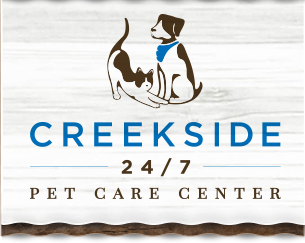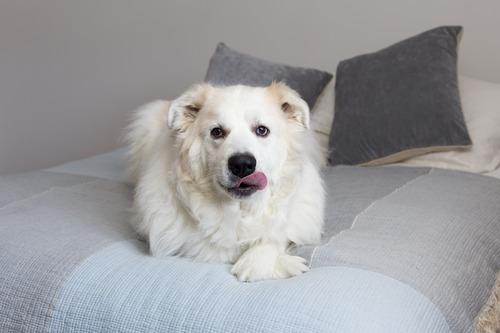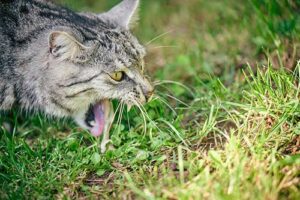It’s late, you’re ready for bed, and just as you’re about to drift off to sleep, you hear the familiar sound of your dog licking their paws. For many pet parents, this behavior can be both puzzling and concerning. In this article, we will explore the reasons why dogs lick their paws at night and when it’s best to seek professional advice from the compassionate team at Creekside Pet Care Center in Keller, Texas. If you’re worried about your pup’s paw-licking, feel free to reach out to us at (817) 421-5850.
Understanding Normal vs. Excessive Licking
Dogs naturally lick their paws to groom themselves. However, when the licking becomes excessive or primarily happens at night, it might signal an underlying issue. Normal paw-licking is often seen as part of grooming, particularly after playing outdoors or walking on dirt. Additionally, dogs may lick their paws to cool down on warm days, and sometimes they lick to calm themselves, similar to how humans fidget. However, when the licking continues for several minutes or even hours, becomes obsessive, or mainly occurs at night, it can be categorized as excessive.
Why Do Dogs Lick Their Paws at Night? Common Causes
Allergies
Allergies are a frequent culprit behind nighttime paw-licking. Dogs can develop allergies to food such as beef, dairy and chicken; environmental triggers like pollen, dust mites, and mold; or contact allergens like household cleaning products or grass can irritate a dog’s paws. Symptoms may include red, inflamed paws, scratching and licking other areas like their ears and belly, or hair loss in the affected regions.
Anxiety and Stress
Much like humans, dogs can suffer from anxiety, which often manifests as repetitive behaviors, including paw-licking. Common stressors include separation anxiety, changes in environment or loud noises such as thunderstorms, fireworks, or loud vehicles. If you notice your dog pacing or whining, exhibiting destructive behavior, or a loss of appetite, they may be feeling anxious.
Pain or Discomfort
Paw-licking can also be a sign of pain, particularly when it happens at night when your dog is at rest. Injuries, arthritis, and interdigital cysts can all cause discomfort and lead to paw-licking. Look out for symptoms like limping, swelling, and sensitivity to touch.
Parasites
Parasites such as fleas, mites, and ticks can cause intense itching, leading to nighttime paw-licking. Fleas can trigger allergic dermatitis, mites can cause mange, and ticks can lead to tick-borne illnesses, all of which can make your dog itchy and uncomfortable. Visible parasites on the skin, frequent scratching, and hair loss are common symptoms.
Dry Skin
Texas heat and dry air can leave your dog’s skin dry and irritated, which can also cause paw-licking at night. Over-bathing or using poor-quality grooming products can exacerbate dry skin issues. Flaky or scaly skin, dandruff-like particles, and excessive scratching are typical signs.
Behavioral Compulsion
In some cases, dogs develop compulsive disorders that cause them to lick their paws excessively, especially at night. This behavior is often triggered by stress, anxiety, or lack of mental stimulation. Persistent licking, self-inflicted sores, and general restlessness are signs of compulsive behavior.
When to Consult Your Veterinarian
If your dog’s paw-licking persists or is accompanied by other symptoms like limping, swelling, or skin changes, it’s time to visit your veterinarian. The team at Creekside Pet Care Center can help identify the root cause and develop a personalized treatment plan for your pup.
What to Expect During a Veterinary Visit
During a veterinary visit, your vet will ask about your dog’s behavior and perform a thorough physical examination. Diagnostic tests such as allergy testing, skin scraping, blood work, and X-rays may be recommended to identify the underlying issue.
Treating Nighttime Paw-Licking
Treatment will vary depending on the underlying cause. For allergies, dietary changes, medications like antihistamines, and environmental adjustments can help manage symptoms. For anxiety, behavioral training, exercise, and medications may be effective. Pain management options include non-steroidal anti-inflammatory drugs (NSAIDs), physical therapy, and joint supplements. Parasite control involves flea and tick prevention, mite treatments, and regular grooming. Dry skin care includes using humidifiers, omega-3 supplements, and moisturizing shampoos. Behavioral therapy, interactive toys, and medications can help manage compulsive behavior.
Preventing Nighttime Paw-Licking
To minimize the chances of excessive licking, consider these preventative measures:
- Routine Grooming: Keep your dog’s paws clean and well-trimmed.
- Regular Vet Visits: Early detection of allergies, parasites, or injuries.
- Mental Stimulation: Puzzle toys, training, and new experiences.
- Consistent Routine: Reduce stress and anxiety with a predictable schedule.
Uncovering Your Dog’s Peculiar Behavior
Excessive paw-licking at night can indicate an underlying issue with your pup’s health, comfort, or emotional state. By understanding the reasons why dogs lick their paws at night and consulting with the experts at Creekside Pet Care Center, you can help your furry friend find relief. If you’re in the Keller, Texas, area and need assistance, give us a call at (817) 421-5850 to schedule a visit.






